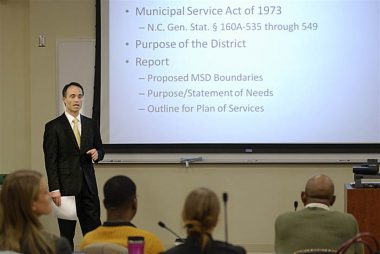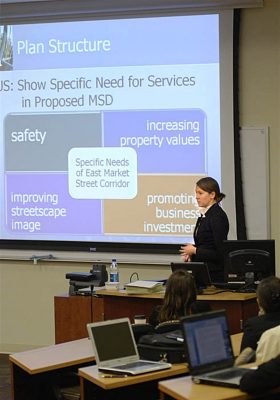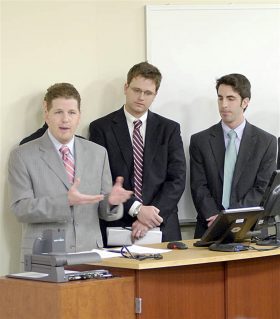Students in the Winter Term course “Public Law & Leadership” made a series of presentations this month to the leaders of four Greensboro nonprofits who sought advice on legal questions involving their work.
With nearly 100 second-year students taking part, multiplied by the number of hours each person spent researching legal opinions and federal and state laws, the professor leading the course estimated that Elon Law students contributed nearly a half million dollars in services to the four organizations.

Nonprofit representatives who attended the Jan. 16 presentations offered several positive reviews following each briefing.
“We have linked our pro bono experience with our leadership program, which is unique among law schools,” said course professor Faith Rivers James. “In essence, we are training our students in the basic precepts of leadership and teaching then how to interact in teams, and then making the connection between the pro bono service in the communities and the leadership needed from people with legal skills.”
Who received help, and what legal issues they presented to students, included the following:

Action Greensboro
The nonprofit organization founded in late 2000 asked students to research ways to bring together the various institutions of higher education in Greensboro (Elon Law, Bennett College, N.C. A&T, Greensboro College, Guilford College, UNC Greensboro) in a joint effort to keep the city economically competitive.
The Volunteer Center of Greensboro
An organization that connects citizen volunteers with nonprofits who need their services, The Volunteer Center of Greensboro asked students to research and suggest procedures for implementing its new “Volunteer Clear” program. The nonprofit wants to minimize its liabilities and strengthen internal/external controls on information related to the new program, which provides a cursory background check on volunteers.

Greensboro Housing Coalition
The GHC, which works to ensure safe and affordable housing for low-income citizens, asked students to research applicable laws in its efforts to “dismantle the structures of racial inequality that impact educational opportunities.”
The East Market Street Development Corporation
The EMSDC asked students to research ways for the nonprofit to bolster economic growth in a corridor that stretches from the eastern edge of downtown east to Market Street’s intersection with Wendover Avenue.
“Lessons learned did not come directly from researching the legal issues but rather the projects and its legal research were conduits for us as students to look at how we function in teams, how teams function, and leadership in legal teams,” said Adam Arthur, a law student in the course. “I learned how to understand and analyze the role I am supposed to play in a team and the role I am supposed to play in relation to a client – which means essentially how to make an internal assessment of the environment and then what proper actions I should take to fill the role for which I am needed.
“These projects allowed us as student to experience in a real world context the dynamics between a client and his/her lawyer.”


